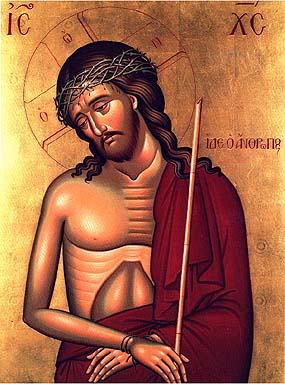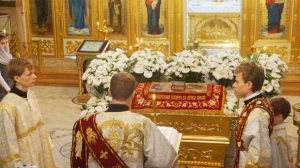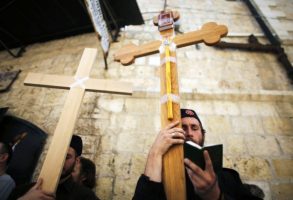Come, O faithful, let us work zealously for the Master, for he distributes wealth to his servants. Let each of us, according to his or her ability increase the talent of grace: let one be adorned in wisdom through good works; let another celebrate a service in splendor. The one distributes his wealth to the poor; the other communicates the word to those untaught. Thus we shall increase what has been entrusted to us, and, as faithful stewards of grace, we shall be accounted worthy of the Master’s joy. Make us worthy of this, Christ our God, in your love for mankind

Christ the Bridegroom
As more and more people attend and thoughtfully follow the services of Holy Week, many are struck by the incomparably rich hymnography, often sung in unique and evocative melodies. Many of us have favorite hymns, which we greet as friends when they come along each year. There are the landmark hymns of the Bridegroom services, repeated for several nights running. There are, of course, the unforgettable moments of Holy Thursday: “Of Thy Mystical Supper!” The Twelve Gospels! Then Friday: the Burial Shroud! The Lamentations!… Then Saturday and the victorious Prokeimenon! These are like lanterns, lighting our way forward in an otherwise dark terrain.
One of my own favorites is a humbler little hymn (blink and you’ve missed it for the year) sung with the Aposticha at Matins and Vespers on Holy Tuesday. Why do we sing such a hymn during Holy Week? Let’s spend a minute examining its liturgical context before looking at it more closely.
By the time we sing this hymn, we have entered squarely into the journey to Christ’s life-giving Passion. We have traveled six weeks of Great Lent. We have celebrated the victorious entry of Our Lord into Jerusalem (a bitter victory: Jesus knowingly enters the city where he is to be betrayed and slain). We have heard him preaching with increased intensity against civil and religious hypocrisy and injustice. But as we follow Jesus’s journey, we also direct attention at ourselves. As we Orthodox always do in our penitential hymnography (for example, in the Canon of St Andrew of Crete), we apply all that hypocrisy, all the examples of pride, lust, murderous intent, to our own lives as we live them. It is not a pretty picture. So we ask God’s forgiveness and beg him to help us to become better human beings.
During Holy Week, this sort of penitence is brought to a high level of intensity, a dosage that we cannot sustain for long. But here we are pushed to our limits, because Our Lord himself, the King of Glory, who made the heavens and the earth, is on his way to being betrayed, abandoned, and slaughtered. Matters do not get any more serious than that. We have to make sure we are paying full attention.
That is why, at the Bridegroom services, usually celebrated on Sunday, Monday, and Tuesday evenings of Holy Week, we pray for several things surrounding the theme of bringing ourselves into realization of who we are and what is happening:
– We ask God to “illumine the vesture of our souls,” to purify us, to give us appropriate clothing in order to celebrate properly the Feast of Feasts.
– We remind our own selves to be wakeful and watchful, rouse ourselves out of our slumber, to penetrate the usual half-awake state of our minds and hearts.
– We contemplate scriptural images as lessons or as inspiration. The common theme to all these services is that of the Bridegroom (Christ) who comes in the middle of the night and finds some who are prepared, others for whom it is now too late. But on different evenings we sing about the withered fig tree, the betrayal of Judas, and—as a positive image—the repentant harlot who wipes Jesus’s feet with her tears and hair.
It is within this broader context, then, that we come to that Holy Tuesday hymn, in which we urge each other to do the particular work that God has given us to do. Let’s look through it to see what it is saying, and why people may be attracted to it.
– We goad each other to work zealously. Don’t almost do something, or just think about doing it, or do it in a half-baked way. Do it, and do it well for the sake of God.
– Notice that God gives the wedding garment. God gives the talent. Without this initial gift, we have nothing, we are nothing. But once we realize that God has filled our otherwise empty vessels, it is very much up to us to take up that gift and to act on it.
– When God distributes his gifts, he is not using a cookie cutter to form identical little shapes. He is not drawing a uniform pattern for us to imitate like robots. We are different from each other; we do not strive to conform to a single model, even if sometimes the image of a virtuous person in the Church’s Tradition seems frustratingly uniform. In iconography and spiritual literature (depending on where we’re looking) we might find a preponderance of monks, bishops, and virgins. But if we look closer, we find a message applicable to school teachers, social workers, bankers, moms, dads, writers, sanitation workers—people from all walks of life and different talents.
– When it begins enumerating tasks, our hymn encourages us to “do good works”—whatever our station of life, whatever our vocation. Then it identifies specific vocations—but let us take note how these are both particular and universal in character.
– One “celebrates a service in splendor.” (When I was sacristan during my student days at Saint Vladimir’s Seminary, I watched as Fr Paul Lazor, the consummate liturgical celebrant, made a large and meaningful sign of the cross over himself during that line.) Although this verse does carry a particular, clerical meaning, doesn’t it also pertain to our corporate celebration of the liturgy? All of us celebrate the liturgy in splendor when we participate meaningfully in it. Going still further, can this not also pertain to any way in which we—whether lay or ordained—as “priests” offer the world to God, making our whole life a creative service of splendor?
– In the Divine Liturgy we pray for “those who remember the poor.” Is helping the poor, then, something that someone else always does? No. Although we recognize realistically that not everyone is called to make his or her whole life a service to the poor, none of us is off the hook in the basic, universal, Christ-imitating vocation of ministry to the poor, solidarity with the outcast, speaking out against injustice.
– While teaching the Word applies in a particular way to teachers and catechists, don’t we all impart knowledge and wisdom—both explicitly and implicitly Christian Truth—in our various vocations (not least those of us who are parents or godparents)?
Wherever we are, whatever we do, whatever our station in life our task is to build upon what we have been given. First, of course, we have to identify the gift, and that is not always simple. But by understanding the gift and recalling that it indeed comes from God himself, we can build on it. The gospels tell us that wasting our talents is one of the things that seriously displeases God. But we pray that, if we recognize and work with our gifts, we will be “deemed worthy of the Master’s joy,” a joy that is beyond anything that we can imagine.



















